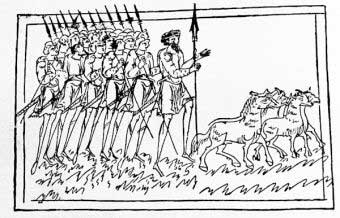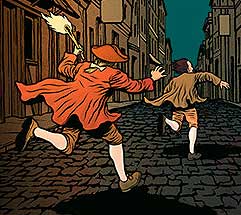Law Enforcement by
Mutual Aid: The Bohr
Law Enforcement by
Mutual Aid: The Thief Takers
Among the aims of our upcoming Forum is to consider the extent to which private insurance might, in a free society, take over the functions we currently assign to government. The principles of laissez-faire economics may convince us that private insurance could indeed play this role, but we will undoubtedly feel more confident if this theoretical conclusion can be backed up by concrete examples from history.
In an earlier issue I have discussed how one particular form of insurance, the mutual-aid association, acted as an effective private substitute for government welfare programs, particularly in the area of medical care. ("How Government Solved the Health Care Crisis," Formulations, Vol. I, No. 2.) In this issue my concern is with the role of mutual-aid associations in providing security; and I shall focus on two historical cases from England, which has a long history of private provision of "government" services.
Law Enforcement by Mutual Aid:The Borh
Before the Norman Conquest in 1066, government in England was radically decentralized. The King had little or no role in setting domestic policy; this was left to the moots, local courts that passed judgment in accordance with customary law. The King's authority lay primarily in the area of foreign policy, and here he acted simply as a war leader, a kind of military entrepreneur, whose followers supplied financial contributions and military service voluntarily. England possessed neither a police force nor a standing army; law enforcement and national defense alike were the prerogative and responsibility of the armed citizenry.

For purposes of security, the most important social unit was the borh. A borh was an association, typically of twelve people, who stood surety for one another's good behavior. If a member of a borh committed a crime, the other members were committed to bringing him to justice — but also to helping him pay restitution for his crime. (Financial restitution rather than retribution was the normal sentence for most crimes; those who refused to pay restitution were outlawed, that is, placed outside the law — meaning that anyone could kill them with impunity.)
The borh may have originated as a kinship group, but if so, its kin-based aspects soon dwindled; at the height of the Anglo-Saxon system, borhs were purely contractual arrangements. Individuals were free to apply to a borh of their choosing, and members of that borh were likewise free to accept or refuse the applicant; once accepted, an individual was free to leave, and could also be expelled. Since the members of the borh would be held responsible for one another's actions, there was a strong incentive to police members' behavior. Likewise, there was a strong incentive to belong to a borh and not be kicked out, because few were willing to deal with someone who belonged to no borh; such a person was in effect an uninsured risk, since he had no fellow borh-members standing surety for him. The borh system thus created powerful incentives for responsible behavior.
As Tom Bell notes:
Such reciprocal voluntary agreements have a certain timeless appeal. Consider the modern parallels: like insurance agencies, the surety groups [borhs] helped members to spread risk by pooling assets; like credit bureaus, they vouched for the good stand- ing of their own members and denied access to outsiders who had demonstrated their unworthiness; like credit card companies, they stood behind the claims and acts of their members." - "Polycentric Law," p. 4.
It might be objected that such a system could not work in today's vast, impersonal, and highly mobile society, where the close ties and personal knowledge required for effective borh membership are often absent. Reputation, it might seem, can serve as an effective incentive only in a small community where everyone knows everyone else. But the experience of the Law Merchant suggests otherwise: this vast system of private mercantile law that operated via reputation, credit, and economic boycott, was able to regulate commercial transactions across all Europe in the late Middle Ages, among merchants of different nations, without the benefit of either face-to-face interaction or government enforcement. And in the modern information age of instantaneous electronic communications, credit reports, and the like, one might well expect reputation to serve even more effectively as a tool for maintaining social order privately.
What ultimately destroyed the borh system was the subjection of England in 1066 by the Norman invader William the Conqueror, who sought to consolidate his victory by completing a centralization of royal power that had actually begun as early as the ninth century with Aelfred the Great. William and his successors sought to bring the borh system under royal supervision and control, in part so that a healthy slice of the financial compensation administered by the borhs could be diverted to the royal coffers.
Whatever the reason, the Norman conquerors introduced the Frankpledge system, which replaced the borhs with tithings, ten-person groups that served the same function as the old borhs — with the crucial exception that membership in a tithing was not voluntary. Without the right of free entry and exit, and the correlative right to refuse admittance or to expel, the Frankpledge system could not reproduce the incentives of the former system. The borh system penalized irresponsible behavior; but under the Frankpledge system, a tithing had no comparable leverage over its members, who could now misbehave with impunity. The element of competition had been eliminated — with predictably bad results.
Law Enforcement by Mutual Aid: The Thief Takers

In the late eighteenth and early nineteenth centuries, the mutual-aid approach to law enforcement was active in England once again. England had no police force in the modern sense before 1829, when Home Secretary Sir Robert Peel (whence the term "Bobby") established Scotland Yard for the London area; similar police administrations for other areas followed in the 1830s and 1840s. The classical liberal feminist and social reformer Josephine Butler responded with alarm, penning a ringing denuciation of the budding police state in her book Government by Police.
But before the reign of the Bobbies, English law enforcement relied heavily on organizations known as Associations for the Prosecution of Felons — also known as thief-takers' associations. Imagine a cross between a Neighborhood Watch group, an insurance agency, and an Old West style posse. People in a particular neighborhood would pool their resources, and supply their own labor, to support their local thief-takers' association. The association would keep its eyes open for robbers (particularly those who robbed houses displaying the plaque of association membership!). If a crime (against an association member) did occur, the association would hunt down, or pay to have hunted down, the wrongdoer, often cooperating with similar associations in other districts — and then use the pooled resources to pay for the felon's prosecution in a government court. (Criminal justice was not free in those days.)
The traditional English system — with its roots in Anglo-Saxon antiquity, but extending as recently as the nineteenth century — is worlds away from the modern system of centralized police and gun control. Under the old system, every able-bodied male citizen was in effect a policeman, and the behavior of these policemen was regulated not by government edict but by the laws of economic self-interest. Despite important differences in details, both the borhs and the thief takers operated according to the principle of mutual assurance: individuals pooled their resources and effort for the purpose of mutual protection.
Is insurance for security a libertarian fantasy? On the contrary — it's history.
Bibliography
H. W. Arthur. Without the Law: Administrative Justice and Legal Pluralism in Nineteenth-Century England. University of Toronto Press, Toronto, 1985.
Tom Bell. "Polycentric Law." Humane Studies Review, Vol. 7, No. 1, 1991/92.
Bruce Benson. The Enterprise of Law: Justice Without the State. Pacific Research Institute, San Francisco, 1990.
Stephen Davies. "Private Provision of Public Goods in Nineteenth-Century Britain." Unpublished paper.
Douglas Hay and Francis Snyder, eds. Policing and Prosecution in Britain, 1750-1850. Oxford University Press, Oxford, 1989.
Albert Loan. "Institutional Bases of the Spontaneous Order: Surety and Assurance." Humane Studies Review, Vol. 7, No. 1, 1991/92.
William Alfred Morris. The Frankpledge System. Longmans Green, New York, 1910.
